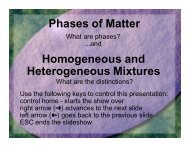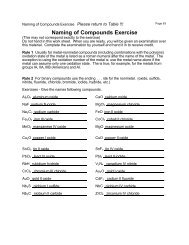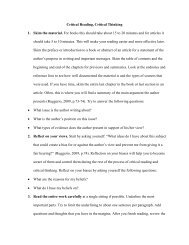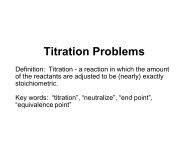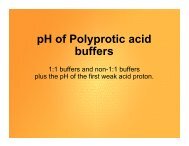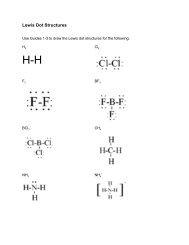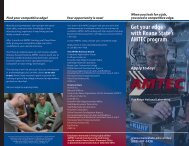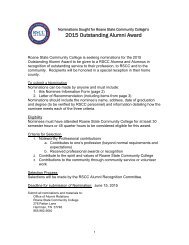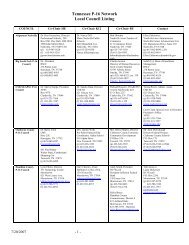2006-2008 Catalog - Roane State Community College
2006-2008 Catalog - Roane State Community College
2006-2008 Catalog - Roane State Community College
You also want an ePaper? Increase the reach of your titles
YUMPU automatically turns print PDFs into web optimized ePapers that Google loves.
7111-<strong>Roane</strong>StCommColl 6/16/06 2:58 PM Page 218<br />
Course Descriptions<br />
218 ROANE STATE COMMUNITY COLLEGE<br />
EHT 210—Environmental Instrumentation . . . . . . . . . . . . . . . . . . . . . . . . 3 Credits<br />
Provides an introduction to those instruments used to evaluate such occupational hazards as<br />
noise, radiation, heat stress, oxygen deficiency, explosive atmospheres, and hazardous chemicals<br />
and an examination of techniques for characterizing water, wastewater, and hazardous<br />
wastes. Environmental sampling techniques and protocols are presented.<br />
EHT 211—Safety and Emergency Response . . . . . . . . . . . . . . . . . . . . . . . 3 Credits<br />
A review of federal, state, and local emergency response guidelines and methods for protecting<br />
workers employed in hazardous waste operations and emergency response.<br />
EHT 215—Applied Radiological Control Technology . . . . . . . . . . . . . . . . 3 Credits<br />
Study of the core academic knowledge and skill required of entry level radiation control technicians.<br />
Includes applying skills in mathematics, algebra, physical sciences and life sciences to<br />
the control of occupational exposure of workers to ionizing radiation. Topics include radiation<br />
mathematics, physical sciences, nuclear physics, sources of radiation, biological effects of radiation,<br />
radiological protection, exposure control, and radiation detector theory and operation.<br />
EHT 225—Special Topics in Environmental Health. . . . . . . . . . . . . . . . 1-3 Credits<br />
This elective course is designed to allow instruction in special topics deemed necessary to meet<br />
the demands of business and industry.<br />
EHT 230—Industrial Hygiene and Safety II . . . . . . . . . . . . . . . . . . . . . . . 3 Credits<br />
A more in-depth analysis of the physical, biologic, and chemical hazards encountered in the<br />
workplace. Topics include exposure to temperature extremes, noise, radiation, hazardous<br />
chemicals, and biologic hazards including bloodborne pathogens. Specific administrative and<br />
engineering controls and personal protective equipment are presented.<br />
EHT 242—Internship . . . . . . . . . . . . . . . . . . . . . . . . . . . . . . . . . . . . . . . . . . 4 Credits<br />
Work experience designed to familiarize students with applications of principles utilized in the<br />
environmental field. Students must attain at least 200 contact hours. No student may enroll in<br />
an internship without the approval of the instructor.<br />
FRENCH<br />
FREN1010—Beginning French I . . . . . . . . . . . . . . . . . . . . . . . . . . . . . . . . . 3 Credits<br />
Elementary grammar, pronunciation, and conversation through textbooks supplemented by<br />
audio cassettes, filmstrips, computer programs, and videotapes. (No prerequisite)<br />
FREN 1020—Beginning French II. . . . . . . . . . . . . . . . . . . . . . . . . . . . . . . . 3 Credits<br />
Continuation of Beginning French I. (Prerequisite: FREN 1010)<br />
FREN 2010—Intermediate French I . . . . . . . . . . . . . . . . . . . . . . . . . . . . . . 3 Credits<br />
Advanced grammar and conversation through use of textbooks supplemented by audio cassettes,<br />
filmstrips, computer programs, videotapes, and selected readings. (Prerequisite:<br />
FREN 1020)<br />
FREN 2020—Intermediate French II . . . . . . . . . . . . . . . . . . . . . . . . . . . . . 3 Credits<br />
Continuation of Intermediate French I. (Prerequisite: FREN 2010)<br />
GEOGRAPHIC INFORMATION SYSTEMS<br />
GIS 101—Introduction to Geographic Information Systems . . . . . . . . . . 4 Credits<br />
An introductory course dealing with the basics of using computerized map information in science,<br />
education, social science, and business applications. Students will learn to organize their<br />
own projects using mapping software, spatial data, and a variety of geographic information<br />
technologies and tools. Business, education, and social science applications emphasize demographic<br />
data while scientific applications emphasize environmental and facility management<br />
issues. (Prerequisite: Working knowledge of Windows or Macintosh based PC systems) F, Sp




